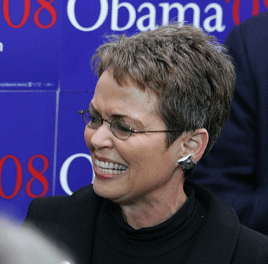“Divisiveness has no place in our politics. . .spitefulness and hatred only erode that which is truly magnificent about our country.” [Sharon Pratt Dixon Kelly]
Sharon Pratt, like many First Women, holds several firsts:
–The First Woman To be hired as a Vice President at Potomac Electric Power Company–
–The First Woman To be selected as Treasurer of the Democratic National Committee
–The First Woman To be elected as Mayor of Washington, D.C.
–The First African American Woman To be elected Mayor of a Major American City
Sharon Pratt’s biography reflects some consistent patterns in the lives of women born in mid twentieth-century who rose to prominence. The first, and more mundane, issue is her name. Currently she manages a consulting firm she founded, Pratt Consulting, and uses her maiden name Sharon Pratt. When she ran for mayor of Washington, D.C., she carried her husband’s name, Sharon Pratt Dixon. Shortly after her election, however, she married a second time and became Sharon Pratt Kelly. Knowing how to report her name as mayor presented a bit of a conundrum to me and I am certain many of us who changed our names will present future problems for historians and genealogists.
The second commonality with other women that we witness in her life is the issues on which she chose to focus. As a lawyer, executive and politician, her focus, like many women of that era, was on issues more often considered “women’s issues.”
Her first job was as a lawyer in her father’s firm, Pratt and Dixon. Although she had wanted to be an actress, her father, a Superior Court Judge, persuaded her to attend Howard where she majored in political science and then attended law school. In her practice she supported the rights of children in the middle of custodial battles, provided juveniles with representation and practiced family rights law, a new area of the law at that time.
After a stint as a law professor, she was hired by the Potomac Electric Power Company (PEPCO) and became their Vice President for Public Policy, not only the first woman, but also the first African American, to serve as vice president for the utility. During her tenure, she created programs focused on low-income residents and senior citizens in Washington, D.C.
She was also active in politics, serving first as committee representative to the Democratic Party from Washington, D.C. and then from the country’s Eastern region. She was the first woman to serve as Treasurer of the party.
When she ran for Mayor of Washington, D.C., it was after the implosion of Marion Barry, arrested on charges involving cocaine use. She wore a pin shaped like a shovel and promised to “clean house with a shovel, not a broom.” She vowed to overhaul city government and took a slogan that feels familiar today, “Yes We Will.” She won with 86% of the vote.
Her efforts to overhaul government and remove corruption were largely unsuccessful, but during her tenure, infant mortality was reduced, services for families increased and emergency ambulance service improved. An initiative to increase black and Hispanic business ownership was also a focus of her efforts. During her one-term tenure she led an initiative to increase black and Hispanic business ownership. She also petitioned Congress for statehood status for Washington, D.C., a fight continued today by Eleanor Holmes Norton (see my blog of August 26, 2013).
Sharon Pratt Kelly was voted out of office when Marion Barry resurrected himself, after serving prison time, and was re-elected by Washington, D.C. citizens. Although Sharon Pratt believed that divisiveness does not belong in politics, it was divisiveness that eventually led to her defeat as Mayor and to her retirement from politics. In today’s political environment her words would be well taken to heart.
LEARN MORE:
Jessie Carnie Smith, Epic Lives: One Hundred Black Women Who Made a Difference (Detroit, Michigan: Visible Ink Press, 1993)
See more at: http://www.blackpast.org/aah/kelly-sharon-pratt-dixon- 1944#sthash.2eU1HiXS.dpuf
QUESTION OF THE WEEK:
Do women today still focus on “women’s issues” or are they free to work on issues that were previously dominated by men?

